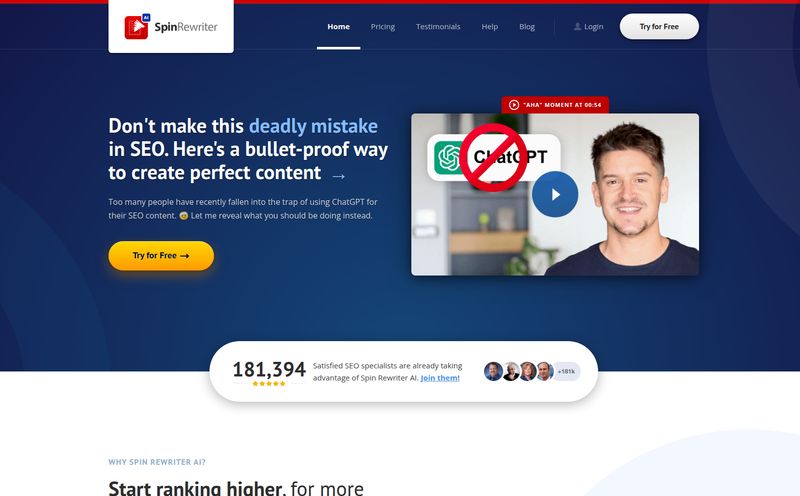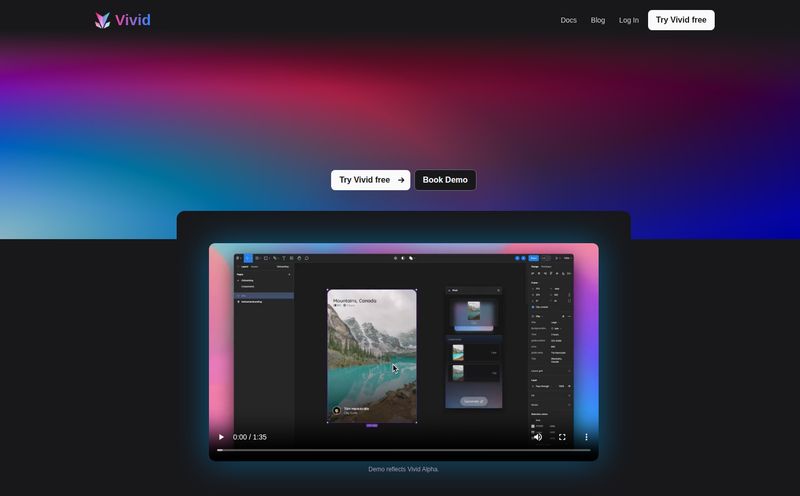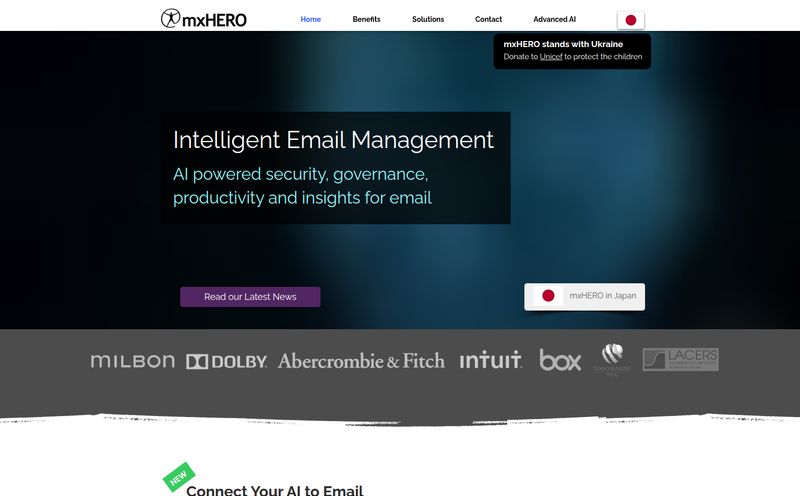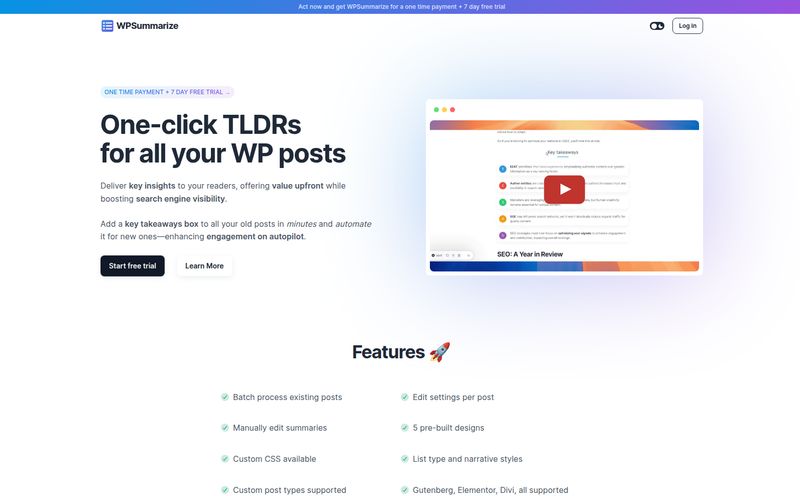If you’ve spent any time in the last year or two building anything with Large Language Models, you know the cycle. First comes the excitement—the pure magic of seeing GPT-4 or Llama 2 spin up text that feels like it was written by a person. Then comes the reality. The spaghetti-code mess of juggling API keys from OpenAI, Cohere, and Anthropic. The stomach-drop moment when your costs start spiraling. And the late-night debugging sessions trying to figure out why the model suddenly started outputting gibberish to your users. It's a chaotic, exhilarating, and frankly, exhausting new frontier.
I’ve been in the SEO and traffic game for years, and I’ve watched countless tools promise to be the “next big thing.” Most of them are just noise. But every so often, something comes along that doesn’t just add a feature; it solves a fundamental, hair-pulling problem. A few weeks ago, I stumbled upon Keywords AI, a platform that calls itself a “unified developer platform for LLM applications.” My initial thought? “Great, another API wrapper.”
But then I saw the tagline they were using: essentially, Datadog for LLM applications. Now that got my attention. For anyone who's ever managed production systems, you know Datadog is the gold standard for observability. The idea of having that level of insight into the black box of an LLM… well, that’s not just a feature, it’s a lifeline. So I decided to take a closer look.
What Exactly is Keywords AI? More Than Just Another API Wrapper
Let's get this straight first: calling Keywords AI just an API wrapper is like calling a Swiss Army knife just a knife. Sure, at its core, it provides a unified API endpoint to access a whole bunch of different models. You can see it on their homepage—OpenAI, Llama, Cohere, all the big names are there. This alone is a pretty big deal. No more writing custom logic to handle different request formats or manage a dozen API keys in your environment variables. Amen to that.

Visit Keywords AI
But the real magic, the part that justifies its existence, is everything else built around that API. It’s a complete system for building, deploying, and—most importantly—monitoring your AI apps. They claim you can integrate it with just two lines of code change. Seriously. You basically just change the API endpoint URL you're calling. It feels almost too simple, but from what I can see, that’s the actual pitch. It’s the closest thing I’ve seen to a plug-and-play control center for your entire AI stack.
Think of it like this: You have a universal remote that works for your TV, your soundbar, and your Blu-ray player (if you still have one of those). That's the unified API. But what if that same remote also told you the battery life of every device, which shows were most popular in your house, and alerted you when the picture quality on one of them started to degrade? That’s Keywords AI.
The All-in-One Toolkit: Breaking Down the Features
So what do you actually get with this platform? It’s not just one thing, its a combination of tools that address different stages of the AI development process.
A Unified API That Actually Simplifies Your Stack
I touched on this already, but it's worth repeating. The sheer convenience of having one consistent way to call multiple LLMs from different providers cannot be overstated. It makes it dead simple to A/B test models against each other. Is GPT-4-Turbo really worth the extra cost over Llama 3 for your specific use case? With a tool like this, finding out is a matter of changing a parameter, not rewriting half your backend. This encourages experimentation and optimization, which is how you build a great product instead of just a functional one.
Finally, Proper LLM Monitoring and Observability
This is the killer feature, in my opinion. Once your app is live, you're flying blind. Keywords AI gives you pre-built dashboards to visualize the holy trinity of LLM ops: latency, cost, and quality. You can see exactly how much each API call is costing you, how long it's taking, and trace individual user sessions to debug problems. They even have features for auto-evaluations, where you can set up criteria to automatically flag bad or weird responses. This transforms monitoring from a reactive, panicked scramble to a proactive, data-driven process. No more guessing why your AI assistant suddenly developed a strange obsession with pirates. You can actually trace it back and see what happened.
Prompt Engineering and Experiments Made Sane
Every AI developer has a folder somewhere on their computer filled with `prompt_v1.txt`, `prompt_v2_final.txt`, and `prompt_v2_final_for_real_this_time.txt`. It’s a mess. Keywords AI provides a dedicated “Playground” and prompt management system. It’s a collaborative space to test, version, and manage your prompts. It’s a small quality-of-life improvement that has a massive impact on team productivity and sanity.
From Data to Fine-Tuning: Closing the Loop
Here’s something that really points to the future. The platform includes powerful tools for collecting and curating datasets directly from your production traffic. You can identify high-quality interactions, flag them, and export them into a dataset ready for fine-tuning a model. This is the holy grail. It creates a feedback loop where your live application is constantly feeding you the data you need to make your AI smarter and more tailored to your specific domain. It’s how you build a competitive moat that’s impossible for others to replicate.
Let’s Talk Money: A Look at Keywords AI Pricing
Okay, so what’s all this going to cost? The pricing structure seems pretty well thought out for their target audience of startups and developers. It's a classic tiered model, which I've broken down here.
| Plan | Price | Best For | Key Features |
|---|---|---|---|
| Free | $0 / month | Getting started, weekend projects | 2k logs/mo, 1 user, community support |
| Pro | $7 / user / month | Indie hackers & solo founders | 10k logs/mo, 1 team, 1k user analytics |
| Team | $42 / user / month | High-growth startups | 100k logs/mo, 5 teams, private Slack support |
| Custom | Request a trial | Large organizations / Enterprise | Unlimited everything, compliance (SOC 2), dedicated support |
The Free plan is generous enough to actually build and test something real. The Pro plan at $7/user/month is a no-brainer for any serious indie hacker. It's the cost of two fancy coffees for a month of sanity. The Team plan is where it gets serious, and the Custom plan is for when you've hit the big leagues. It's a pricing ladder that makes sense, letting you grow into the platform as your application succeeds.
My Honest Take: The Good, The Bad, and The Nitty-Gritty
So, am I sold? Mostly, yes. The value proposition is incredibly strong.
What I love: The sheer simplicity of the integration is genius. Developers have a very low tolerance for friction, and that “2 lines of code” promise is music to their ears. The unified platform approach just makes sense. It solves a problem that almost every single AI team is facing right now. And the monitoring tools are not just a nice-to-have; they are absolutely critical for building reliable, production-grade AI features. This isn't just a cost-effective alternative to GPT-4, its a whole new way of managing your AI development lifecycle.
The potential hiccups: Let's be real, nothing is perfect. The platform is clearly built for developers, and you'll likely need some familiarity with how LLMs and APIs work to get the most out of it. This isn't a no-code tool for your marketing department. A question I still have is about performance—any time you put a layer in between you and the source API, you risk adding a tiny bit of latency. For real-time applications, every millisecond counts. I'd want to see some benchmarks on that. But for most use cases, the benefits would far outweigh a few extra milliseconds of latency.
Who is Keywords AI Actually For?
After digging in, the audience is crystal clear to me. This is for the builders.
- AI Startups: This is the bread and butter. It gives a small team the power and observability that would typically require a dedicated infrastructure engineer.
- Indie Hackers: The Pro plan seems tailor-made for solo founders who want to build robust AI apps without the enterprise-level price tag.
- Dev Teams in Larger Companies: For teams tasked with prototyping new AI features, this is a way to get moving fast without getting bogged down in red tape or having to build an internal monitoring platform from scratch.
Essentially, if you’ve moved past the initial honeymoon phase with LLMs and are now facing the harsh reality of making them work reliably and affordably at scale, Keywords AI is probably for you.
Final Thoughts
Tools like Keywords AI represent the maturation of the AI development space. We're moving beyond the initial Wild West phase into an era where reliability, cost-management, and observability are paramount. It’s not enough to just make a cool demo anymore; you need to build a product. Keywords AI seems like one of those rare platforms that truly understands the practical challenges and provides an elegant, powerful solution. It’s a central nervous system for your AI, and for any team building seriously with this tech, that's an incredibly compelling offer.
Frequently Asked Questions (FAQ)
- Is Keywords AI a replacement for OpenAI or other LLM providers?
- Not at all. It’s a layer that sits on top of them. You still use models from providers like OpenAI, Cohere, etc., but you access and manage them through the Keywords AI platform to get the benefits of the unified API and monitoring tools.
- How difficult is the integration process?
- According to their documentation and marketing, it's incredibly simple. For many existing applications using an OpenAI-compatible API, it's a matter of changing the base URL of your API call and updating your API key. Literally a two-line change in your code.
- Is Keywords AI really cheaper than using GPT-4 directly?
- The platform itself has a cost, but its value proposition is also in cost management. By giving you clear dashboards on your spending and making it easy to test cheaper alternative models, it can help you significantly reduce your overall LLM bill. So while you pay for the platform, it could easily pay for itself in savings and operational efficiency.
- What kind of support can I expect?
- This depends on the plan. The Free plan offers community support. The paid plans offer more direct support, with the Team plan including a private Slack channel and the Enterprise plan offering dedicated support and even consultation.
- Can I use Keywords AI to build my own custom models?
- Yes, that's one of the most powerful features. It helps you collect and curate data from your live application traffic, which you can then use to fine-tune open-source models or even proprietary ones to create a model that's highly specialized for your needs.
- Does Keywords AI support models other than OpenAI's?
- Yes. The images on their site show logos for Cohere, Llama, and others. The core idea is to be a model-agnostic platform, allowing you to use the best tool for the job without being locked into a single ecosystem.
Reference and Sources
- Keywords AI Official Website
- Keywords AI Pricing Page
- What is Observability? by Datadog (For context on the analogy)



